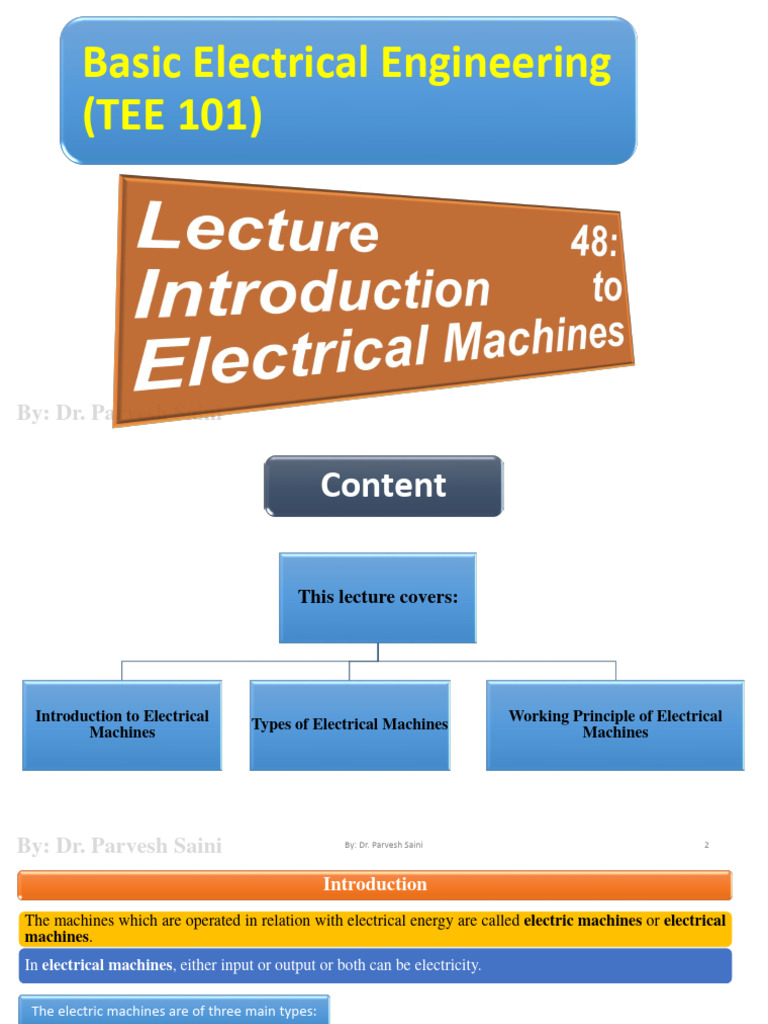The realm of electrical machines is akin to a vast ocean teeming with myriad currents beneath its seemingly placid surface. For newcomers wishing to navigate this intricate landscape, embarking on a journey through electrical machines requires a methodical approach. This guide serves to illuminate the path, ensuring a solid foundation upon which advanced knowledge can be constructed. The study of electrical machines amalgamates engineering principles with practical applications, offering the seeker both intellectual stimulation and real-world relevance.
To begin this voyage, one must first understand the fundamental concepts of electricity and magnetism. These concepts serve as the bedrock upon which the edifice of electrical machines is built. Investigating the laws governing electric fields, magnetic fields, and electromagnetic induction is paramount. It is recommended that learners delve into introductory physics textbooks, which lay out these principles in an accessible manner. Knowledge of Ohm’s Law, Kirchhoff’s laws, and the principles of electromagnetism will act as essential tools in deciphering the complex behavior of electrical machines.
Once the foundational principles are grasped, it becomes imperative to delve into the realm of circuit theory. Electrical machines are deeply intertwined with electrical circuits; thus, a solid understanding of them will facilitate comprehension of how machines operate within a circuit. Studying circuit analysis methods—such as Thevenin’s and Norton’s theorems—will provide insights into the performance of machines when they are part of a more extensive electrical system. Textbooks on circuit theory, complemented by online resources or video lectures, can enhance understanding and provide visualizations that textual explanations often cannot.
Upon establishing a firm grasp of basic electrical concepts and circuit theory, it is time to embark on the core study of electrical machines themselves. The primary categories include AC (alternating current) and DC (direct current) machines. AC machines, which primarily consist of synchronous and asynchronous (induction) motors and generators, represent a critical segment of electrical engineering. Likewise, DC machines, encompassing DC motors and generators, have immense historical and practical significance. A categorical approach simplifies comprehension, allowing students to appreciate the unique operational characteristics and applications of each machine type.
A vital consideration in studying electrical machines is the modeling of their behavior. This can involve mathematical representations, such as equivalent circuits, and simulations utilizing software tools. Software such as MATLAB/Simulink or PSpice enables learners to visualize and predict machine performance under various conditions. Such practical engagement not only reinforces theoretical knowledge but also hones the engineering skills necessary for real-world applications.
Furthermore, developing a thorough understanding of machine performance parameters—such as efficiency, torque, and power factor—will elucidate the subtleties of machine behavior. Investigating performance curves, losses within the machines, and methods to enhance efficiency contributes to a more holistic view of electrical machines. Engaging with peer-reviewed journals and recent research in the field can offer insights into cutting-edge developments and prevailing trends in electrical machines, fostering a spirit of inquiry.
Collaboration and peer discussion are also invaluable components of the educational experience. Participating in study groups or forums allows for the exchange of ideas and troubleshooting techniques, fostering an understanding of varied perspectives. Online platforms, such as engineering forums or social media groups dedicated to electrical engineering, are excellent avenues to connect with fellow learners and experienced professionals alike. These interactions can provide clarity on complex concepts or practical applications of electrical machines that may otherwise appear daunting when approached in isolation.
Practical experience is indispensable in the realm of electrical machines. Engaging in laboratory work, internships, or hands-on projects will reinforce theoretical learning. Universities and engineering colleges often provide well-equipped laboratories where students can experiment with real machines. Projects could involve the assembly of miniature induction motors or the experimentation with transformers in controlled environments, thereby offering tangible insights into machine functionality. This experiential learning not only crystallizes theoretical knowledge but also cultivates crucial problem-solving skills.
Moreover, field trips and industrial visits can galvanize theoretical discussions, linking them with real-world applications. Witnessing electrical machines operating at large scales, be it in manufacturing plants, power generation stations, or transportation systems, illuminates the practical significance and impact of electrical machines in daily life. Such experiences serve to solidify learning and inspire future aspirations within the field of electrical engineering.
Inextricably linked with the study of electrical machines is the evolution of sustainable technology. As society moves towards renewable energy sources and electrification, understanding how electrical machines operate efficiently within these systems will be paramount. Engaging with materials on electric vehicles, renewable energy systems, and smart grid technology will enhance learning and keep abreast of the industry’s trajectory. Such studies ensure a future-ready mindset, integral for aspiring engineers.
Finally, as knowledge expands, cultivating a passion for lifelong learning is essential. The field of electrical machines is ever-evolving, with technological advancements and innovative methodologies introduced regularly. Attending workshops, conferences, and symposia allows individuals to embrace continuous learning, thus remaining at the forefront of the discipline. Engaging with scholarships and advanced studies further deepens expertise, presenting opportunities for specialization in areas such as robotics, automation, and renewable energy applications.
In conclusion, embarking on the study of electrical machines is akin to charting unexplored waters. It requires a robust understanding of fundamental principles, collaborative engagement, practical experience, and adaptability to evolving technologies. By laying an intricate foundation and continually building upon it, one can navigate the complexities and appreciate the beauty of electrical machines, leading to a rewarding and impactful career in engineering.










